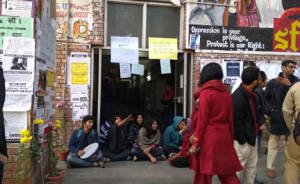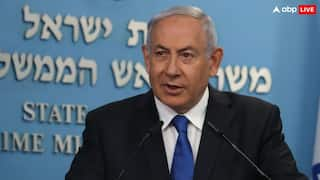Explorer
Attendance rule backlash in JNU
Protests at JNU over compulsory attendance

New Delhi: Two years ago to the day, Jawaharlal Nehru University fell on the crosshairs of the media after a campus event to commemorate the third anniversary of the execution of 2001 Parliament Attack convict Afzal Guru was disrupted by Sangh-backed student-group Akhil Bharatiya Vidyarthi Parishad (ABVP). Three students were arrested based on televised video clips of the event although a magisterial inquiry later found many of these visuals to be doctored. On Friday, almost no classes took place. Students picketed at the entrances of academic buildings and blocked a road in protest against the introduction of compulsory attendance - a first in the varsity feted as the country's best by the President last year. The protest was supported even by the ABVP. Several students this paper spoke to drew parallels with the outpouring of student rage in campus and on the streets of Delhi. History student Umar Khalid, who was arrested along with fellow-scholar Anirban Bhattacharya and then-president of the students union Kanhaiya Kumar, was too busy writing his doctoral thesis on the modern history on Singhbhum, to participate in the students' strike. He told The Telegraph: "In the last two years, we have seen the method shift from a televised spectacle to subversion of the institution from within through seat cuts (last year), (freshman) Najeeb Ahmed going missing, arbitrary hiring of teachers and multiple heavy fines on students that preceded this 75 per cent attendance rule - all in order to change the character of JNU." No one has been charged in the sedition case and all three students are out on bail. Umar and Kanhaiya, who wrote a book on his ordeal and is currently at the Kerala Literature Festival, are due to submit their doctoral theses this July. Anirban now works in a think-tank. "The attempt was never to prosecute," adds Umar, "but to polarise the country and legitimise the attack on varsities. Our case was practically tried in a court of public opinion rather than the courts of law." Home minister Rajnath Singh said the protests were backed by Pakistan-based insurgent Hafiz Saeed although no proof was given. The then human resource development minister Smriti Irani named in Parliament students allegedly involved in the February 9 event. Outside the School of Social Sciences on Friday, assistant professor of science policy Rajbeer Singh tried to push his way in through the picket line, knocking down SFI's JNU vice-president Gayatri Balu and getting into a scuffle with orders. Both Singh and Balu have complained to the police, a rare occurrence in JNU when strikes are almost always voluntary and peaceful.  The Congress's National Students Union of India (NSUI) has blocked a road leading to the administrative block, disrupting bus services to parts of the 1,000-acre campus. JNU's NSUI president Vikas Yadav said: "Yesterday, a university circular has threatened to stop scholarships and withdraw hostel and medical facilities to thousands of students who have boycotted the attendance. Tomorrow, the VC may even impose hostel curfews and dictate what food we eat. By blocking the road, we have forced the JNUSU to take a radical and rational stand by calling a one-day strike, lest the VC feel encouraged by the meekness of protests and continues to implement the government's agenda of reducing the expenditure on education." Aditi Chatterjee, JNUSU councillor of the school of languages, said: "Bachelors and masters students are evaluated on class performance anyway and most research scholars teach outside or travel frequently on field work or libraries. Yesterday's circular has created panic that has led to the total strike." Several teachers have been supporting the students by not taking attendance since last month. The teachers associations have asked the VC to review the decision that as allegedly passed without discussion. VC M. Jagadesh Kumar and other officials did not respond to questions. "More than anything else," said Abhay Kumar, due to submit his doctoral thesis in history, "a researcher needs peace of mind, which the vice chancellor has replaced with a siege mentality by issuing new circulars everyday. A student cannot think of talking about Kashmir or Chhattisgarh when his existence in the university itself is in doubt. As a masters student, I took 29 courses, while the required minimum was 16. You don't need attendance but peace of mind to learn."
The Congress's National Students Union of India (NSUI) has blocked a road leading to the administrative block, disrupting bus services to parts of the 1,000-acre campus. JNU's NSUI president Vikas Yadav said: "Yesterday, a university circular has threatened to stop scholarships and withdraw hostel and medical facilities to thousands of students who have boycotted the attendance. Tomorrow, the VC may even impose hostel curfews and dictate what food we eat. By blocking the road, we have forced the JNUSU to take a radical and rational stand by calling a one-day strike, lest the VC feel encouraged by the meekness of protests and continues to implement the government's agenda of reducing the expenditure on education." Aditi Chatterjee, JNUSU councillor of the school of languages, said: "Bachelors and masters students are evaluated on class performance anyway and most research scholars teach outside or travel frequently on field work or libraries. Yesterday's circular has created panic that has led to the total strike." Several teachers have been supporting the students by not taking attendance since last month. The teachers associations have asked the VC to review the decision that as allegedly passed without discussion. VC M. Jagadesh Kumar and other officials did not respond to questions. "More than anything else," said Abhay Kumar, due to submit his doctoral thesis in history, "a researcher needs peace of mind, which the vice chancellor has replaced with a siege mentality by issuing new circulars everyday. A student cannot think of talking about Kashmir or Chhattisgarh when his existence in the university itself is in doubt. As a masters student, I took 29 courses, while the required minimum was 16. You don't need attendance but peace of mind to learn."
 The Congress's National Students Union of India (NSUI) has blocked a road leading to the administrative block, disrupting bus services to parts of the 1,000-acre campus. JNU's NSUI president Vikas Yadav said: "Yesterday, a university circular has threatened to stop scholarships and withdraw hostel and medical facilities to thousands of students who have boycotted the attendance. Tomorrow, the VC may even impose hostel curfews and dictate what food we eat. By blocking the road, we have forced the JNUSU to take a radical and rational stand by calling a one-day strike, lest the VC feel encouraged by the meekness of protests and continues to implement the government's agenda of reducing the expenditure on education." Aditi Chatterjee, JNUSU councillor of the school of languages, said: "Bachelors and masters students are evaluated on class performance anyway and most research scholars teach outside or travel frequently on field work or libraries. Yesterday's circular has created panic that has led to the total strike." Several teachers have been supporting the students by not taking attendance since last month. The teachers associations have asked the VC to review the decision that as allegedly passed without discussion. VC M. Jagadesh Kumar and other officials did not respond to questions. "More than anything else," said Abhay Kumar, due to submit his doctoral thesis in history, "a researcher needs peace of mind, which the vice chancellor has replaced with a siege mentality by issuing new circulars everyday. A student cannot think of talking about Kashmir or Chhattisgarh when his existence in the university itself is in doubt. As a masters student, I took 29 courses, while the required minimum was 16. You don't need attendance but peace of mind to learn."
The Congress's National Students Union of India (NSUI) has blocked a road leading to the administrative block, disrupting bus services to parts of the 1,000-acre campus. JNU's NSUI president Vikas Yadav said: "Yesterday, a university circular has threatened to stop scholarships and withdraw hostel and medical facilities to thousands of students who have boycotted the attendance. Tomorrow, the VC may even impose hostel curfews and dictate what food we eat. By blocking the road, we have forced the JNUSU to take a radical and rational stand by calling a one-day strike, lest the VC feel encouraged by the meekness of protests and continues to implement the government's agenda of reducing the expenditure on education." Aditi Chatterjee, JNUSU councillor of the school of languages, said: "Bachelors and masters students are evaluated on class performance anyway and most research scholars teach outside or travel frequently on field work or libraries. Yesterday's circular has created panic that has led to the total strike." Several teachers have been supporting the students by not taking attendance since last month. The teachers associations have asked the VC to review the decision that as allegedly passed without discussion. VC M. Jagadesh Kumar and other officials did not respond to questions. "More than anything else," said Abhay Kumar, due to submit his doctoral thesis in history, "a researcher needs peace of mind, which the vice chancellor has replaced with a siege mentality by issuing new circulars everyday. A student cannot think of talking about Kashmir or Chhattisgarh when his existence in the university itself is in doubt. As a masters student, I took 29 courses, while the required minimum was 16. You don't need attendance but peace of mind to learn." 





































